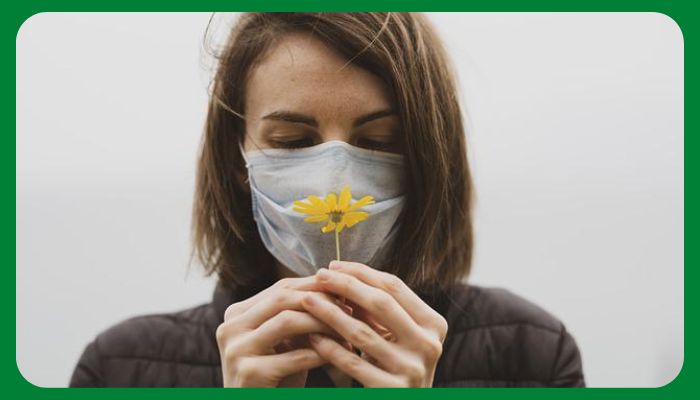Table of Contents
What is Parosmia?
Parosmia is a health condition that affects the olfactory system or the sense of smell of a person. It occurs when the smell receptors cells in the nose called olfactory sensory neurons, don’t detect odors or smells and relay them to the brain effectively. It also occurs when a person experiences a loss of scent intensity that is the person detects the odor that is present in the substance. For example, when a person smells food and finds it unpleasant or the person smells the perfume and finds it offensive.
Causes of Parosmia
The following are the causes of Parosmia:
Tumor
Tumor growth is rare to cause parosmia. But when it occurs, it could be as a result of tumors on the olfactory bulbs, in the frontal cortex, and the sinus cavities which causes changes to the sense of smell.
Neurological conditions
Conditions like Parkinson’s disease, Alzheimer’s disease, Lewy body dementia, and Huntington’s disease also cause difficulty in smell.
Exposure to toxins and chemicals
The toxins and chemicals in cigarettes are so dangerous that they can cause damage to the olfactory system.
Radiation or Chemotherapy
This occurs majorly in cancer patients that have undergone chemotherapy. The radiation generated during the treatment may be high and end up having side effects which as usually weight loss and malnutrition. This side effect is found to be connected to Parosmia.
Covid-19 infection
Being a viral disease or infection, it is observed that the virus makes changes to the olfactory system, where sustained damage may change the way the person smells after recovery.
Environmental exposure
Exposure to airborne pollutants has been one of the causes that trigger parosmia. Accidental exposure to pollutants, poor hygiene from industries, or low level of exposure to toxins in ambient air over a long period. The exposures can lead to olfactory disorders, temporary olfactory fatigue, and then parosmia.
Parosmia symptoms
The following symptoms are exhibited when a person has parosmia:
- Sensing a persistent foul odor: The person may have difficulty noticing some scents in the environment or perceiving the smell of foods or perfume.
- Scents become unbearable: The person starts to feel nauseous or sick when perceiving the scents.
- Reduced appetite: The appetite for foods starts to reduce.
- Brain-related ones: symptoms like headache, seizure, memory problems, personality changes, nausea, and vomiting.
- Allergy: A person may exhibit allergy symptoms like asthma, allergic eyes, eczema, hives, and allergic shock.
- Neurological symptoms: Examples are memory loss, disorientation of time and place, misplacing time, and difficulty in performing certain tasks.
- Other symptoms: Some other symptoms like a stuffy nose, cough, sore throat, fever, sticky and dry mouth, frequent thirst, and cracked lips.
Diagnosis of Parosmia
Paris is can be diagnosed by an otolaryngologist also known as an ear-nose-throat doctor or ENT doctor. During the diagnosis, the doctor may do the following:
Ask questions
The doctor may ask questions about; the family history of cancer, any neurological problems, or any recent infections that the person has had, the lifestyle the person has, and any medication been taken so far.
Test neurological system
The doctor does this by testing on Sinus CT, a biopsy of the sinus region, and an MRI.
Parosmia Treatment
Smell training
A technique used to treat parosmia due to COVID-19 is Smell training. It is also known as Olfactory training. It involves sniffing the same group of scents for 20 seconds at a time. It should be done twice per day for 3 months and longer. The scents that should be used for the training are fruity, flowery, spicy, and resinous, and they are found in lemon, rose, clove, and eucalyptus.
Change of lifestyle
A change of lifestyle can help to improve the smell condition. Eat foods that are cold or at room temperature, as heat can enhance scents. Focus on food items like oatmeals, and vegetables. Limit the consumption of certain foods like meats, onions, and eggs. Open the windows to help dissipate scents that trigger parosmia. Avoid areas or locations or places associated with strong aromas or scents such as perfume stores, grocery places, restaurants, and shopping malls.
Use of drugs and medications
The use of neurologic and antiepileptic medications like gabapentin, is used to promote neuronal regeneration. Use of drugs such as Clonazepam(Klonopin), Topiramate(Qudexy XR, Topamax, Trokendi XR), Valproic acid, Phenytoin(Dilantin, Phenytoin Infatabs, Phenytek). These drugs tend to ease it. The use of corticosteroid-nasal drops, rinses, or tablets helps to reduce inflammation. The use of sodium citrate nasal drops increases sensitivity to odorants or scents by increasing the potential for olfactory receptors. The use of Zinc Sulphate tablets help go cause increased ability the smell.
Use of Supplements
Supplements like Omega-3 supplements helps to reduce inflammation and has regenerative and neuroprotective effects. Also, Alpha lipoic acid capsules help to stimulate the expression of nerve growth factors due to their antioxidants and neuroprotective features.
Read here how to stop and prevent hair shedding. Click here
Frequently Asked Questions
How long does it take to recover from it?
Well, it has been investigated that the condition could last up to six months, but the average duration is around three months.
Is there any permanent treatment for it?
There is no known treatment for it but some activities can help to reduce it like smelling strong scents daily to train the brain again.
When should one see a doctor?
A: After one has done the treatment and after six months of doing smell training or when the symptoms for a while.

